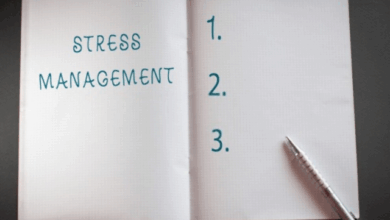Discover strategies for managing daily stress

Life throws a lot at us. From work deadlines and family commitments to unexpected bills and global events, it’s easy to feel overwhelmed. Stress isn’t just a feeling; it’s a physical and emotional response, and chronic stress can take a serious toll on your well-being. But here’s the good news: you can learn to manage daily stress and protect your mental health. It’s not about eliminating stress entirely – that’s unrealistic – but about building resilience and developing healthy coping mechanisms. This article will explore practical strategies to help you navigate the challenges of everyday life and prioritize your mental health awareness. We’ll cover everything from simple mindfulness techniques to building a strong support system and recognizing when to seek professional help. It’s time to take control and create a more peaceful, balanced life. Learning to manage stress is a journey, not a destination, and every small step you take makes a difference.
Key Takeaways
- Identify Your Stressors: Understanding what triggers your stress is the first step to managing it.
- Practice Mindfulness: Simple techniques like deep breathing and meditation can calm your mind and body.
- Build a Support System: Connecting with friends, family, or support groups provides emotional resilience.
- Prioritize Self-Care: Make time for activities you enjoy and that help you recharge.
- Establish Healthy Boundaries: Learning to say “no” protects your time and energy.
- Physical Activity is Key: Exercise releases endorphins, which have mood-boosting effects.
- Seek Professional Help When Needed: Don’t hesitate to reach out to a therapist or counselor.
Understanding the Impact of Daily Stress
Stress isn’t always bad. A little bit of stress can actually motivate us to perform better. This is often called “eustress.” However, when stress becomes chronic, it can lead to a host of physical and mental health problems. Think of it like a rubber band – a little stretch is okay, but too much can cause it to snap. Prolonged stress can contribute to anxiety, depression, heart disease, digestive issues, and a weakened immune system. Recognizing the signs of chronic stress – like irritability, fatigue, difficulty concentrating, and changes in sleep or appetite – is crucial for taking action. Many people experience symptoms of stress without realizing the underlying cause, leading to a cycle of feeling unwell. Understanding the connection between daily pressures and your overall well-being is a cornerstone of mental health awareness.
Identifying Your Personal Stressors
What specifically causes you stress? It’s not always obvious. Keeping a stress journal can be incredibly helpful. For a week or two, jot down situations that make you feel stressed, along with your physical and emotional reactions. Are there common themes? Is it work-related deadlines, financial worries, relationship conflicts, or something else entirely? Sometimes, stressors are external – things happening to you. Other times, they’re internal – your own thoughts and beliefs. For example, perfectionism or negative self-talk can be significant stressors. Once you identify your stressors, you can start to develop strategies to address them. This process of self-discovery is vital for proactive mental health management.
Mindfulness and Relaxation Techniques
Mindfulness is the practice of paying attention to the present moment without judgment. It sounds simple, but it can be surprisingly powerful. There are many ways to practice mindfulness, including:
- Deep Breathing Exercises: Taking slow, deep breaths can calm your nervous system. Try the 4-7-8 technique: inhale for 4 seconds, hold for 7 seconds, and exhale for 8 seconds.
- Meditation: Even 5-10 minutes of daily meditation can reduce stress and improve focus. There are many guided meditation apps available.
- Progressive Muscle Relaxation: This involves tensing and relaxing different muscle groups in your body.
- Body Scan Meditation: Focus your attention on different parts of your body, noticing any sensations without judgment.
These techniques help shift your focus away from anxious thoughts and bring you into the present moment. Regular practice can build resilience to stress over time.
The Power of Physical Activity
Exercise isn’t just good for your body; it’s also fantastic for your mind. Physical activity releases endorphins, which have mood-boosting effects. It can also help reduce stress hormones like cortisol. You don’t need to run a marathon to reap the benefits. A brisk walk, a bike ride, dancing, or even gardening can make a difference. Aim for at least 30 minutes of moderate-intensity exercise most days of the week. Finding an activity you enjoy is key to making it a sustainable habit. Consider joining a fitness class or finding an exercise buddy for added motivation.
Building a Strong Support System
Humans are social creatures, and we need connection to thrive. Having a strong support system – friends, family, or a support group – can provide emotional resilience during stressful times. Talk to people you trust about what you’re going through. Sharing your feelings can help you feel less alone and gain valuable perspective. Don’t be afraid to ask for help when you need it. Sometimes, just knowing someone is there to listen can make a world of difference. Participating in community activities or volunteering can also foster a sense of belonging and connection.
Setting Healthy Boundaries
Learning to say “no” is a crucial skill for managing stress. Many of us feel obligated to say “yes” to requests, even when we’re already overwhelmed. But constantly taking on more than you can handle will inevitably lead to burnout. Setting healthy boundaries means protecting your time, energy, and emotional well-being. It’s okay to prioritize your own needs. Politely decline requests that don’t align with your priorities or that will add unnecessary stress to your life. Remember, saying “no” to others is saying “yes” to yourself.
Prioritizing Self-Care
Self-care isn’t selfish; it’s essential. It’s about taking time for activities that nourish your mind, body, and soul. What brings you joy? What helps you relax and recharge? It could be anything from reading a book to taking a bath to spending time in nature. Make self-care a non-negotiable part of your routine. Schedule it into your calendar just like any other important appointment. Even small acts of self-care can make a big difference in your overall well-being.
The Importance of Sleep
Sleep is often the first thing to suffer when we’re stressed, but it’s also one of the most important things we can do to manage it. Aim for 7-9 hours of quality sleep each night. Create a relaxing bedtime routine to help you wind down. Avoid caffeine and alcohol before bed. Make sure your bedroom is dark, quiet, and cool. Prioritizing sleep can significantly improve your mood, focus, and ability to cope with stress. A consistent sleep schedule is also beneficial for regulating your body’s natural rhythms.
Healthy Eating Habits for Stress Management
What you eat can also impact your stress levels. A diet high in processed foods, sugar, and caffeine can exacerbate anxiety and mood swings. Focus on eating whole, unprocessed foods like fruits, vegetables, lean protein, and whole grains. Stay hydrated by drinking plenty of water. Consider limiting your intake of alcohol and caffeine. Nourishing your body with healthy foods can provide the energy and nutrients you need to cope with stress effectively.
Recognizing When to Seek Professional Help
Sometimes, despite our best efforts, stress becomes overwhelming. If you’re struggling to cope, don’t hesitate to seek professional help. A therapist or counselor can provide support, guidance, and evidence-based strategies for managing stress and improving your mental health. There’s no shame in asking for help. In fact, it’s a sign of strength. Resources like the National Alliance on Mental Illness (https://www.nami.org/) can help you find a mental health professional in your area.
Cognitive Behavioral Techniques for Stress Reduction
Cognitive Behavioral Therapy (CBT) is a type of therapy that focuses on identifying and changing negative thought patterns and behaviors. CBT techniques can be incredibly effective for managing stress and anxiety. One common technique is cognitive restructuring, which involves challenging and reframing negative thoughts. For example, instead of thinking “I’m going to fail,” you might reframe it as “I’m going to do my best, and that’s enough.” Learning these techniques can empower you to take control of your thoughts and emotions.
Journaling for Emotional Release
Writing down your thoughts and feelings can be a powerful way to process emotions and reduce stress. Journaling doesn’t have to be perfect or grammatically correct. Just write whatever comes to mind. It can be a free-flowing stream of consciousness or a more structured reflection on your day. Journaling can help you identify patterns in your thoughts and behaviors, gain clarity, and release pent-up emotions.
Practicing Gratitude
Focusing on the things you’re grateful for can shift your perspective and boost your mood. Take a few minutes each day to write down things you appreciate, no matter how small. It could be a beautiful sunset, a kind gesture from a friend, or simply a warm cup of coffee. Practicing gratitude can help you cultivate a more positive outlook on life and build resilience to stress.
FAQs
Q: What’s the difference between stress and anxiety?
A: While often used interchangeably, stress is typically a response to an external trigger, while anxiety is a feeling of worry or fear that can persist even when the trigger is gone. Both impact mental health awareness, but anxiety often requires more focused intervention.
Q: Is it possible to completely eliminate stress from my life?
A: No, it’s not realistic to eliminate stress entirely. Life will always present challenges. The goal is to learn to manage stress effectively so it doesn’t overwhelm you.
Q: How can I help a friend who is struggling with stress?
A: Be a good listener, offer your support, and encourage them to seek professional help if needed. Avoid minimizing their feelings or offering unsolicited advice.
Q: What are some quick stress-relief techniques I can use in the moment?
A: Deep breathing exercises, taking a short walk, listening to calming music, or practicing mindfulness can all provide quick relief.
Q: When should I consider seeing a therapist for stress management?
A: If stress is interfering with your daily life, relationships, or work, or if you’re experiencing symptoms of anxiety or depression, it’s a good idea to seek professional help.
Let’s continue to prioritize our mental health. Remember, taking care of yourself is not a luxury; it’s a necessity. Start small, be patient with yourself, and celebrate your progress. You deserve to live a life filled with peace, joy, and well-being. If this article resonated with you, please share it with someone who might benefit from these strategies. Let’s spread awareness and support each other on this journey to better mental health.
Hi, I’m Sophia! Welcome to my blog Try Stress Management (trystressmanagement.com), where I share simple, down-to-earth ways to handle stress and bring more calm into everyday life. Think of me as your friendly guide, offering practical tips, reflections, and little reminders that we’re all figuring this out together.
When I’m not blogging, you’ll usually find me with a good book, sipping tea, or exploring new walking trails. I believe small changes can make a big difference—and that a calmer, happier life is possible for everyone.




